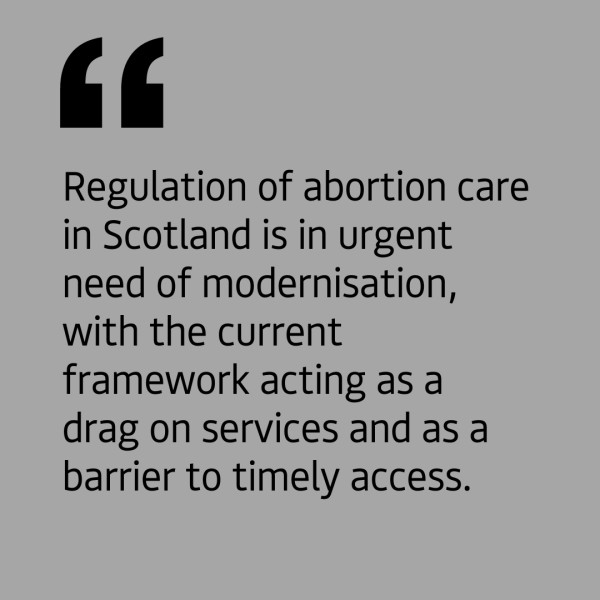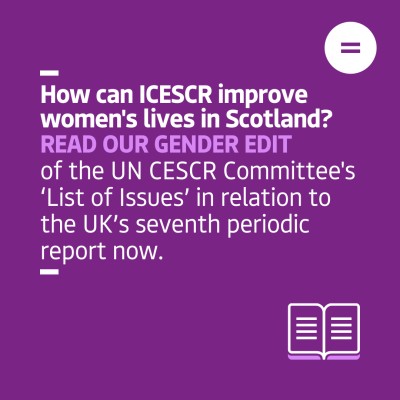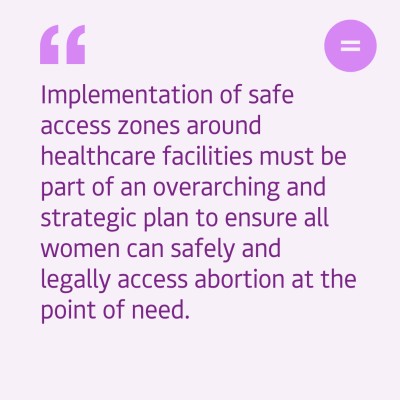Engender blog
Making the case for decriminalising abortion
The campaign to decriminalise abortion has gained momentum in recent months, and Engender has continued to advocate for change. We've pulled together a quick rundown of our recent work on this issue and the need for progress.

The Background
In England, women have been prosecuted and sentenced for procuring their own abortions, attracting media attention and leading to protests and other activities by advocates for reform.
Regulation of abortion care in Scotland is in urgent need of modernisation, with the current framework acting as a drag on services and as a barrier to timely access. The Scottish Government’s recent commitment to bring forward proposals to decriminalise abortion by the end of the parliamentary term (2026) has come on the back of increased scrutiny, policy and advocacy efforts by a range of stakeholders.
Why?
Abortion healthcare is vital to women's equality and wellbeing. It is a routine reproductive health procedure, with around one in three women needing an abortion in their lifetime in the UK.
Like most Scots, Engender supports women to make decisions about ending or continuing a pregnancy, and we’ve long called for change to ensure women’s reproductive rights are fully realised. Unfortunately, the current legal and regulatory regime means that women can be criminalised for procuring abortions, that two doctors need to authorise a woman’s decision to terminate a pregnancy, and that this impacts treatment such that it does not always best meet women's needs.
What have we done so far?
Last September, we joined Abortion Rights Scotland to hold a webinar session on decriminalisation, which set out key arguments in terms of women’s equality, the perspective of clinicians, and the legal status quo. You can watch the webinar online here. Our submission in response to a public petition to decriminalise abortion, alongside other evidence gathered by the Petitions Committee earlier this year, highlights key arguments for decriminalisation and urges the Committee to seek further and fuller evidence following this petition.
Earlier this month, Engender joined with eight other organisations - focused on women’s equality, abortion rights and health - to discuss the Scottish Government’s recent commitments with the Minister for Public Health and Women’s Health, Jenni Minto MSP. This followed a collective letter to the then-newly appointed First Minister in June, which was co-signed by 18 organisations, expressing our support for his commitment to remove abortion from the criminal justice system, and calling for an expert working group to support the development of proposals.
An expert working group
September’s Programme for Government contained a commitment to review of the current legal framework, and our call to create an expert working group has been accepted. The meeting with the Minister was a welcome opportunity to discuss this work, and to highlight the need for reform in terms of impacts on service provision and intersectional women’s equality and the importance of drawing on different women’s experiences of accessing abortion care.
What's next?
In terms of next steps, we focused on the need to act swiftly on establishing the review if we are going to see real progress by 2026, alongside transparent and established resourcing. We highlighted unintended consequences that have arisen internationally when reforming abortion law, with regards to access to services, and how this emphasises the need for lived experience input from different groups, alongside a broader focus on what the new regime will look like on the ground for women. Linked to this, we want to see the process rooted in established international human rights standards and norms, which make clear that abortion has no place in criminal law.
At Engender, we will be publishing a paper looking in detail at abortion within Scots law and different approaches that could be taken to achieve decriminalisation and a better service for women in Scotland. Please keep a look out for this and work around this important issue across Scotland in the months ahead.
New report reveals devastating impact of Covid-19 on access to pregnancy and maternity services
Engender and the Health and Social Care Alliance Scotland (the ALLIANCE) have today published a new report spotlighting women’s experiences of pregnancy and maternity services during the Covid-19 pandemic.
The report, ‘“Trauma, abandonment and isolation”: Experiences of pregnancy and maternity services in Scotland during Covid-19’, draws on survey responses from over 200 women across Scotland. It documents the profound and negative impact that public health restrictions had on access to vital healthcare across all aspects of these services from antenatal care, fertility treatment, to miscarriage and baby loss, birth and the postnatal period.
Key findings include:
- Confusing, contradictory and limited communication about Covid-19 mitigation measures caused extreme anxiety and distress for pregnant women.
- The shift away from in-person care to remote appointments was a barrier to adequate standards of care.
- Isolation as a result of restrictions negatively affected all aspects of pregnancy and maternity care. Women underwent invasive procedures, gave birth, and suffered miscarriage and baby loss without support, suffering trauma as a result.
- Inflexible and inconsistent application of guidelines across different health board areas and health settings led to uncertainty and perceptions of unfairness.
- A narrow focus on labour and delivery meant wider health needs were overlooked, including mental health and breastfeeding support.
- Gendered health inequalities, such as pain management and the lack of an intersectional approach, were exacerbated by the pandemic.
- Ongoing impacts include gaps in mental health support and experiences of trauma relating to isolation and poor care.
Jill Wood, Policy Manager at Engender, said:
“This research indicates that Covid-19 guidance and its application fundamentally failed to take account of women’s diverse needs and experiences during pregnancy and early motherhood. Confusing and contradictory communication, lack of in-person care and support, inflexible restrictions and inconsistent approaches across health board areas all undermined access to safe, dignified and quality healthcare.”
“The trauma caused by attending procedures and giving birth alone and the subsequent isolation, lack of support and adequate care, will stay with women long into the future."
"Scottish Government must learn from this, improve maternal health more broadly, and deliver on commitments on women’s health.”
Jane Miller, Academy Programme Manager at the ALLIANCE, said:
“Pregnancy and early parenthood can be challenging at the best of times. Our research shows that mitigation measures brought in during the pandemic exacerbated isolation and anxiety for many women in Scotland.”
“There is now an urgent need to centre the experiences and priorities of women in the ongoing Covid-19 Inquiry, and in the development of any future emergency guidance regarding healthcare. We must mitigate the risk of isolation and adopt flexible, person-centred approaches grounded in human rights and gender equality.”
A research participant said:
“It is essential that Scotland learns from people's experiences during the pandemic to improve maternity services and public health messaging. To do otherwise would be to fail, and further compound the trauma, of thousands of parents over the last few years.”
The report concludes with a series of recommendations aimed at the Scottish Covid-19 Inquiry and decision-makers in Scottish Government and health bodies. It highlights the need for a gendered and human rights approach to crisis management regarding healthcare, and for policy and services to take account of women’s particular experiences and needs at all life stages.
The report will be submitted as evidence to the Scottish Covid-19 Inquiry.
Read the report online here.
Call for expert working group on decriminalisation of abortion accepted by Scottish Government
Abortion care in Scotland is in urgent need of modernisation, with the current framework acting as a drag on services and as a barrier to timely access. In June we wrote to the First Minister on abortion rights, alongside 16 other equalities, abortion and health organisations. In the letter, we welcomed the commitments made on the leadership campaign trail and called for creation of an expert working group on decriminalisation of abortion.
We are delighted that this suggestion has been accepted by Scottish Government. We now look forward to sharing how women in Scotland can feed into the review of current structures, and to Humza Yousaf’s commitment on decriminalisation being set out in this year’s Programme for Government. Read the letter and see a list of signatories below.

Dear First Minister,
We hope this letter finds you well and congratulate you on your appointment as First Minister of Scotland.
During your leadership campaign, we welcomed your commitments to protecting and advancing abortion rights. The implementation of nationwide buffer zones, consistent provision of abortion care for all that need it, and removal of abortion from the criminal justice system are vital elements of modern abortion healthcare in Scotland. We also need action to tackle growing capacity gaps across services, to ensure equality of access to person-centred abortion care, and to ensure that NHS staff are working in fully equipped and well-resourced services.
Steady progress has been made regarding abortion in recent years. The NHS Scottish Abortion Care Providers Group has worked closely with Scottish Government to advance commitments set out in the Women’s Health Plan, including early medical abortion at home, telemedical care, and improved provision of mid-term abortions across the country.
We now look forward to further progress under your leadership, and to working with the Scottish Government and Women’s Health Champion towards delivery of your commitments. We are aware that Scottish Government already has regular engagement with the NHS Scottish Abortion Care Providers Group, which will, of course, continue to be invaluable. Building on your commitment to move forward decriminalisation of abortion, we believe that an expert working group would be of assistance to Scottish Government Ministers on this topic, and would welcome the opportunity to discuss this further.
Women's economic, social and cultural rights in Scotland

We recently submitted a shadow report, signed by 20 organisations, to the Seventh periodic report of the government of the United Kingdom on measures taken to give effect to ICESCR. In this blog, we share our gender edit of the List of Issues published by the CESCR Committee and take a look at some key issues raised.
The UN Committee on Economic Social and Cultural Rights is currently examining the UK on its performance under ICESCR (the International Covenant on Economic, Cultural, and Social rights). In 2022, the UK submitted its state party report (including input on devolved matters from Scottish Government), and the Committee received ‘shadow reports’ from civil society. Earlier this year we submitted a shadow report, co-signed by twenty organisations, which maps women’s rights in Scotland across the articles of ICESCR and highlights potential areas of focus for the Committee’s scrutiny. You can read more about our shadow report here.
Safe access to abortion services in Scotland

Engender recently submitted a response to the consultation on the proposed Abortion Services (Safe Access Zones) (Scotland) Bill. We’ve given a brief rundown of key points in this blog. You can access the full submission here, which covers the specific questions raised in the consultation around implementation of safe access zones locally and nationally, the size of potential safe access zones, the effect of current protests on women and staff, as well as the impact on human rights and other measures needed to improve abortion services in Scotland.
Everyone deserves to access reproductive healthcare free from abuse and harassment. Unfortunately, today in Scotland we still see women, and others accessing pregnancy and abortion services, targeted by those who do not believe in bodily autonomy or our right to choose. Following recent activism from organisations and campaigns including Back Off Scotland and others, Scotland is now making progress towards establishing safe access zones (also known as ‘buffer zones’) to enable people to access services in safety.
Downloads
 Engender Briefing: Pension Credit Entitlement Changes
From 15 May 2019, new changes will be introduced which will require couples where one partner has reached state pension age and one has not (‘mixed age couples’) to claim universal credit (UC) instead of Pension Credit.
Engender Briefing: Pension Credit Entitlement Changes
From 15 May 2019, new changes will be introduced which will require couples where one partner has reached state pension age and one has not (‘mixed age couples’) to claim universal credit (UC) instead of Pension Credit.
 Engender Parliamentary Briefing: Condemnation of Misogyny, Racism, Harassment and Sexism
Engender welcomes this Scottish Parliament Debate on Condemnation of Misogyny, Racism, Harassment and Sexism and the opportunity to raise awareness of the ways in which women in Scotland’s inequality contributes to gender-based violence.
Engender Parliamentary Briefing: Condemnation of Misogyny, Racism, Harassment and Sexism
Engender welcomes this Scottish Parliament Debate on Condemnation of Misogyny, Racism, Harassment and Sexism and the opportunity to raise awareness of the ways in which women in Scotland’s inequality contributes to gender-based violence.
 Gender Matters in Social Security: Individual Payments of Universal Credit
A paper calling on the Scottish Government to automatically split payments of Universal Credit between couples, once this power is devolved to the Scottish Parliament.
Gender Matters in Social Security: Individual Payments of Universal Credit
A paper calling on the Scottish Government to automatically split payments of Universal Credit between couples, once this power is devolved to the Scottish Parliament.
 Gender Matters Manifesto: Twenty for 2016
This manifesto sets out measures that, with political will, can be taken over the next parliamentary term in pursuit of these goals.
Gender Matters Manifesto: Twenty for 2016
This manifesto sets out measures that, with political will, can be taken over the next parliamentary term in pursuit of these goals.
 Scottish NGO Briefing for UN Special Rapporteur on Violence Against Women
Joint briefing paper for the UN Rapporteur on Violence Against Women.
Scottish NGO Briefing for UN Special Rapporteur on Violence Against Women
Joint briefing paper for the UN Rapporteur on Violence Against Women.

Newsletter
Sign up to receive our newsletter here:
Sign up to our mailing list
Receive key feminist updates direct to your inbox: